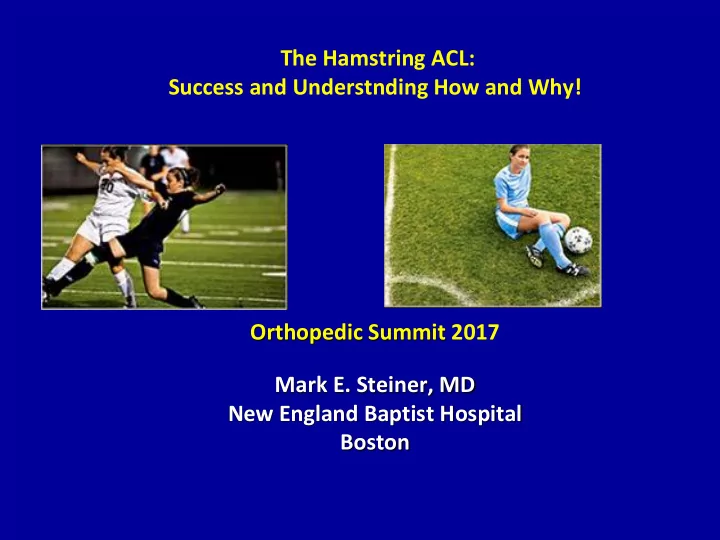

The Hamstring ACL: Success and Understnding How and Why! Orthopedic Summit 2017 Mark E. Steiner, MD New England Baptist Hospital Boston
Disclosures • Royalties Stryker • Fellowship Support Arthre Don Joy Mitek Smith & Nephew Con Med • Research Support Don Joy Stryker
Good and Bad of Hamstring Grafts Good Bad • Easy access • Sensory nerve injury • Doubled G + ST • Incomplete graft harvest > 4000 N strength • Hemorrhage > 700 N/mm stiffness • hamstring weakness • hamstring strength • Minimal donor site morbidity
Patinent Perspective on Graft Options • Internet Information • Good in HS & College athletes • Offer all Options Revisions • Hamstring Graft concerns: Retears Muscle weakness Infection Years Small Graft Anxiety Poor fixation
Retears Scandinavian Registries • 60,000 ACL reconstructions (85% hamstring grafts) Revisions Gifstad AJSM ’14 Hamstrings 2.7 % Rahr AJSM ’13 PT 2.3 % “Ham grafts increased the risk of revision compared with PT” Surgical Technique ? Patient Selection?
Allografts in Athletes ? • MARS group 2014 1205 Revisions, mean age 26 1. “an autograft decreased risk rerupture” 2. “No differences between soft tissue and B-T-B grafts ” • MOON group 2801 ACL all ages 1. Allograft in young athletes increased risk for graft tear 2. No differences between soft tissue and B-T-B grafts • Daruwalla 184 Division I College football players Autograft was associated with a greater RTP
HSS ACL Graft Registry 2009 - 2013 • PT auto 47% • Ham auto 30% • Allograft 23% • No Allograft in < 18 y.o. • Overall revision 5.1% • Failure: No association with graft type (BTB vs Ham)
Kaiser San Diego <18y.o. KSST 2016 • PT auto 10 % • Ham auto 73 % • Allograft 17 % • Revision PT 5.5% • Revision Ham 7.5% • Revision Allograft 13.2%
Infection Ham vs PT (> 7000 cases) • Ham .6 % (20 in 3257 cases) Maletis AJSM ’13 PT .06% ( 2 in 2965 cases) • Ham 2 in 118 Katz Arth’08 PT 0 in 52 Katz Arthroscopy ’08
Graft Irrigation May Prevent Infections No Hamstring irrigation 1.7% infection (1095 cases) Vancomycine Hamstring irrigation 0% infection (2034 cases) Phegan ‘16 Perez ‘16
Graft Size and Graft Strength • Graft size related to height, weight and sex • 4 strand grafts < 8 mm increased failures Spragg ’16 Magnussen ’11 Mariscalco ’13 • ? Tensioning vs Size Hamner ‘99 7 mm Hamner ‘99
Hamstring Tensioning Equal on All Limbs • Manual tension 2831 N • Equally tension 4590 N = PT Hamner JBJS ‘99 NO YES
Making Hamstring Grafts Larger 5 vs 4 strands • Add allograft to make 9 mm Ham = poor results Burrus ’15, McCarty ‘17 ? • Make 5 strand graft = good results Lee ’14 Lavery ‘14
Interference Screw Fixation with Osteoporotic Bone Domnick J Arth ‘17 • Low Fixation Strength with osteoporotic bone • Consider BTB graft with older patients • Consider staple or sutures to a post
Hamstring Weakness with hamstring ACL ? Related to Pain or Regeneration • Normal flexion torque @ 2yr Karlson ‘94 • All tendons regenerated = Normal Flexion and Int Rot Strength Ahlen ‘12 • 11% No Tendon regeneration Less Strength & Agility Choi ‘12
Set Up and Incision • Done in 90° flexion • Vertical Incision near tibial tubercle
Graft Preparation • Circumferential Ligate • Equal tensioning sutures
Locating an “Anatomic” Femoral Tunnel • Remnants • Clock face • Ridges • Measurements
Measurements in 90° flexion Height and Depth Guidelines for Anatomic Femoral Tunnels in Anterior Cruciate Ligament Reconstruction: A Cadaveric Study A. David Davis, M.D. J. Arthroscopy 2016
Measurements to the ACL Center at 90° flexion • 8.5 mm up lateral wall • 1.5 mm deep to the low point
Radiographic Grid Validation of Measurements • ACL height ≈ Prior Measurements • ACL depth: ? Slightly shallow to Prior Measurements Prior measurements
AM Aimer at Height of ACL → Point close to ACL center • 7 mm offset aimer • Elevated 8.5 mm
View Pilot Hole from Medial Portal Lateral Portal View Medial Portal View
Aimer Placed Through AM Portal Pin Positioned in Starter Hole
Guidepin Placement • Pin Exits in safe zone on lateral thigh
Advance Flexible Reamer Over Pin
Tunnel low at 90° = Tunnel posterior at 20° V extended 90°
Tibial Tunnel Placed Relative to Notch • Normal ACL “bundles” into the notch • ACL graft is a cylinder
Tibial Tunnel Placed Medial
Passage of the Graft • One suture tensions all 4 limbs equally
Interference Screw Fixation with Rigid Screwdriver no hyperflexion place pin first to prevent graft / screw wrapping
Tibial Fixation • Equally Tension • Knee in full extension • Fixation with IS = or 1 mm larger than tunnel
Tibial Tunnel Placed Medial
Graft Placement > Graft Type = Stable Knee V 8.5 mm extended 90°
Hamstring Graft for Whom • Patient requests • Pain and motion concerns • recreational athletes • Senior athletes who don’t want an allograft
Recommend
More recommend